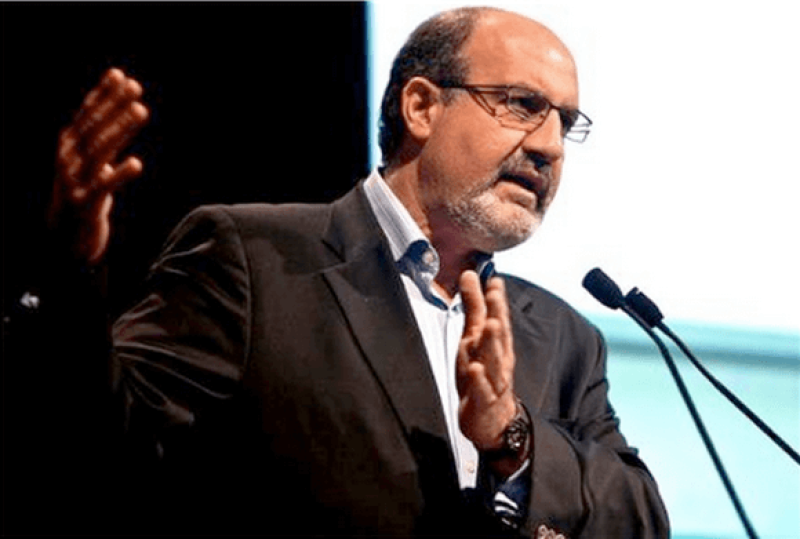Nassim Taleb is a a professor and risk analyst best known for his 2007 book The Black Swan, which criticized the risk management methods used by the finance industry and warned about financial potential crises. More recently he has emerged as a outspoken opponent of genetically modified organisms (GMOs) and claims they will not help address hunger or malnutrition issues.
In the debate about GMOs, Taleb is perhaps best known for the paper titled “The Precautionary Principle (with Application to the Genetic Modification of Organisms)”. He and four colleagues – Yaneer Bar-Yam, Rupert Read, Raphael Douady and Joseph Norman – wrote a paper, The Precautionary Principle (with Application to the Genetic Modification of Organisms, updated in October 2014, in which they claim to bring risk theory and the Precautionary Principle to the issue of whether GMOS might introduce “systemic risk” into the environment. Taleb cautions that GMOs should not be made available to the public until incontrovertible scientific evidence proves they are safe. He portrays GMOs as a ‘castrophe in waiting’ — and has taken to personally lashing out at those who challenge his conclusions — and, calling them “imbeciles” or paid shills.
The crux of Taleb’s claims: There is no comparison between conventional selective breeding of any kind, including mutagenesis which requires the radiation or chemical dousing of seeds (and has resulted in more than 2500 varieties of fruits, vegetables, and nuts, almost all available in organic varieties) versus what his calls the top-down engineering that occurs when a gene is taken from an organism and transferred to another (ignoring that some forms of genetic engineering, including gene editing, do not involve gene transfers). Taleb goes on to argue that the chance of ecocide, or the destruction of the environment and potentially of humans, increases incrementally with each additional transgenic trait introduced into the environment. In other words, in his mind genetic engineering is a classic “black swan” scenario.
In 2014, he accused Anne Glover, then the European Union’s chief scientist, and one of the most respected scientists in the world, of being a “dangerous imbecile” for arguing that GM crops and foods are safe and that Europe should apply science based risk analysis to the GMO approval process — views reflected in summary statements by hundreds of independent science organization in the world. Taleb’s comment was widely circulated by anti-GMO activist web sites.
Neither Taleb nor any of the co-authors has any background in genetics or agriculture or food, or even familiarity with the Precautionary Principle as it applies to biotechology, which they liberally invoke to justify their positions.
Career
Taleb was born in Amioun, Lebanon, to Minerva Ghosn and Najib Taleb, a physician, an oncologist and a researcher in anthropology. His parents were Greek Orthodox Lebanese with French citizenship, and he attended a French school there, the Grand Lycée Franco-Libanais.[1] His family saw its political prominence and wealth reduced by the Lebanese Civil War, which began in 1975. During the war, Taleb studied for several years in the basement of his family’s home.[2]
Both sides of his family were politically prominent in the Lebanese Greek Orthodox community. On his mother’s side, his grandfather, Fouad Nicolas Ghosn, and his great-grandfather, Nicolas Ghosn, were both deputy prime ministers. His paternal grandfather was a supreme court judge; his great-great-great-great grandfather, Ibrahim Taleb, was a governor of the Ottoman semi-autonomous Mount Lebanon Governorate in 1861.[3] Taleb has described himself as Greek Orthodox. The Taleb family Palazo, built in 1860 by Florentine architects for his great-great-great-great grandfather, still stands in Amioun.[4]
Taleb received his bachelor and master in science degrees from the University of Paris. He holds an MBA from the Wharton School at the University of Pennsylvania and a PhD in Management Science (his thesis was on the mathematics of derivatives pricing) from the University of Paris (Dauphine) under the direction of Hélyette Geman.
A polyglot, Taleb has a literary fluency in English, French, and classical Arabic; a conversational fluency in Italian and Spanish; and can read classical texts in Greek, Latin, Aramaic, and ancient Hebrew, as well as the Canaanite script.[5]
He often works with Yaneer Bar Yam at the New England Complex Systems Institute with whom he is a co-author of the GMO-critical “Black Swan” report.
Criticism
- Anti-GMO statistician Taleb defends homeopathy by Debunking Denialism, November 2015: “Over a year ago, statistician Nassim Nicholas Taleb co-wrote an ignorant paper on the precautionary principle and its supposed lethal application to genetically modified foods. In it, the authors made several errors. They asserted, without evidence, that genetically modified crops are more dangerous than conventional crops and failing to consider the benefits of GM crops in preventing vitamin a deficiency, blindness and death (instead falsely comparing it to letting poor people play Russian roulette to get out of poverty)… Taleb has now gone full-blown anti-science. In a couple of recent tweets, he went so far as to defend homeopathy at length…”
- Taleb on GMOs: An Advocate Hiding in an Intellectual’s Clothes by David Ropeik, 2015: “The noted Nassim Nicholas Taleb and colleagues published some thoughts late last year about why the Precautionary Principle should be applied to agricultural biotechnology, more commonly known as genetically modified organisms, or GMOs. Their argument appears thoughtful and erudite, but more closely examined, it reveals itself to be anti-GMO advocacy masquerading as intellectual argument, based on fears of the technology that have no basis in fact and which deny basic evolutionary biology.
- Is Nassim Taleb a “dangerous imbecile” or on the pay of anti-GMO activists? by Jon Entine, November 3, 2014: “He claims that the rapidity of the genetic changes using the rDNA technique does not allow the environment to equilibrate. Yet rDNA techniques are actually among the safest crop breeding techniques in use today because each rDNA crop represents only one to two genetic changes that are more thoroughly tested than any other crop breeding technique. The number of genetic changes caused by hybridization or mutagensis techniques are orders of magnitude higher than rDNA methods. And no testing is required before widespread monoculture-style release. Even selective breeding likely represents a more rapid change than rDNA techniques because of the more rapid employment of the method today. In essence. Taleb’s ecocide argument applies just as much to other agricultural techniques in both conventional and organic agriculture. The only difference between GMOs and other forms of breeding is that genetic engineering is closely evaluated, minimizing the potential for unintended consequences. Most geneticists — experts in this field as opposed to Taleb–believe that genetic engineering is far safer than any other form of breeding.”
References
- 1 Lunch with the FT: Nassim Nicholas Taleb]”, Financial Times (2008-03-28).
- 2 “The new sage of Wall Street,” The Guardian (2008-09-28).”>Helmore, Edward. http://www.guardian.co.uk/books/2008/sep/28/businessandfinance.philosophy
- 3 http://www.fooledbyrandomness.com/talebhistory.pdf
- 4 The Taleb Palazzo in Amioun“, fooledbyrandomness.com (homepage of Nassim N. Taleb). Accessed 16 December 2010.”
- 5 “Where Are You Getting Your Probabilities?”, June 11, 2008, Book Review by James Case http://www.siam.org/news/news.php?id=138






























